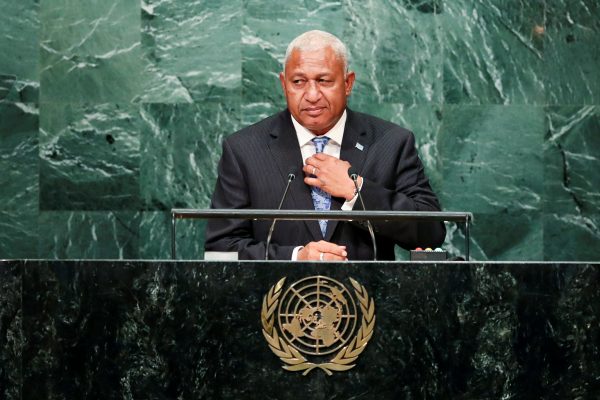These effects include the devastation caused by Cyclone TC Winston, a category five cyclone that swept through the country in February. 44 people lost their lives and 40,000 homes were damaged or destroyed, along with schools and other infrastructure. The Fijian government estimated that the total cost of the disaster was US$1.4 billion. Economic growth, which was predicted to be four per cent, will fall to 2.4 per cent this year.
This national calamity set the stage for the resumption of military and high level political engagement between Fiji, Australia and New Zealand. Within days of the disaster, New Zealand’s Defence Force had mobilised one of its largest peacetime deployments in the Pacific to deliver emergency assistance and help with recovery efforts. Australia similarly deployed its largest naval vessel, the HMAS Canberra, to deliver humanitarian aid to the stricken outer islands.
The foreign ministers of both Australia and New Zealand also made high profile visits to Fiji in the weeks following the cyclone, underscoring the importance both governments placed on their relations with Fiji. New Zealand Prime Minister John Key made his first visit to Fiji in June — 10 years after the last prime ministerial visit — and Bainimarama made a state visit to New Zealand in October. Bainimarama also met with Australian Prime Minister Malcolm Turnbull at the UN General Assembly meeting in New York.
Yet differences were never far from the surface. Bainimarama again stayed away from the Pacific Islands Forum leaders’ summit in September despite efforts by Australia and New Zealand to conclude the regional free trade agreement — PACER Plus — by the end of 2016. Fiji announced it would not sign on until key provisions covering development cooperation and labour mobility had been reviewed. Bainimarama also announced a cabinet reshuffle where he assumed the position of foreign minister and engaged in a sharp exchange of words with Key. This followed the New Zealand leader’s criticism of the arrest and detention of opposition leaders in Fiji, for allegedly breaching the Public Order decree by attending a dialogue on the Constitution.
Two years out from the next general election, Bainimarama’s grip on power appears stronger than ever. This in part reflects his personal popularity and the seemingly broad appeal of his Fiji First party’s social and economic policies. Bainimarama was also able to bask in the reflected glory of the country’s first ever Olympic gold medal win — when its men’s rugby sevens team claimed victory in Rio. Bainimarama extolled the virtues of team discipline and unity — hallmarks of his government’s approach to nation-building. But the corollary to this is a political space increasingly controlled and dominated by the government, with alternative political parties relegated to the margins.
For example, in 2016 Fiji First’ already sizeable majority in Parliament grew as two opposition members were suspended for the remainder of their terms for breaching parliamentary standing orders. This leaves three opposition seats vacant. In November the Geneva-based Inter-Parliamentary Union called for these latest suspensions to be swiftly lifted, describing them as ‘wholly disproportionate’. The Fijian government is yet to respond.
Looking ahead, 2017 is likely to see the 2018 general election preparations gain momentum. The Fijian Elections Office has already begun updating voter records and conducting voter registration. Meanwhile, the opposition Social Democratic Liberal Party (SODELPA) has sought to shore up its position ahead of the next elections by choosing former coup leader and prime minister Sitiveni Rabuka as its new leader. There were indications towards the end of 2016 that a breakaway party may be formed by disgruntled SODELPA supporters. This would further strengthen the current government’s reelection prospects in 2018.
Fiji seems to have emerged largely unscathed from the misfortune and loss inflicted by TC Winston and its international standing is higher than ever. 2017 holds a number of significant firsts for the country, including undertaking the first presidency by a Pacific island state of the 23rd UN Climate Change Conference as well as the first presidency by a Fijian UN Ambassador of the UN General Assembly. Fiji will also co-host the UN Oceans Conference with Sweden in 2017. Addressing the UN General Assembly in September, as leader of a ‘small but influential nation’, Bainimarama had good reason to express – a sense of pride.
Sandra Tarte is Head of the School of Government, Development and International Affairs at the University of the South Pacific.
This article is part of an EAF special feature series on 2016 in review and the year ahead.

